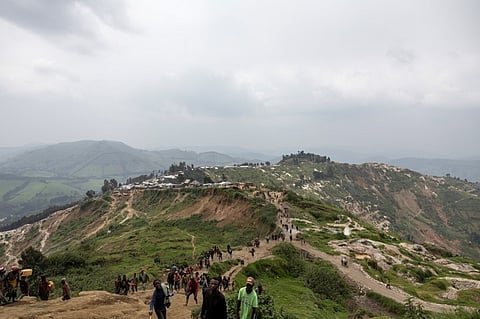
- NEWS
- the EDIT
- COMMENTARY
- BUSINESS
- LIFE
- SHOW
- ACTION
- GLOBAL GOALS
- SNAPS
- DYARYO TIRADA
- MORE

KINSHASA, DR Congo (AFP) — The United States wants to secure its supply of strategic minerals in conflict-torn Democratic Republic of Congo (DRC), hoping to challenge China’s near-monopoly on the lucrative sector.
While the strategy has been in the works for years, Washington has doubled down on it since Donald Trump’s return to the White House in January.
Although it is among the world’s 15 least developed countries, the DRC has some of the richest mineral veins on the planet.
Besides gold and uranium, its mines contain significant deposits of copper, cobalt, coltan and lithium, with uses ranging from weaponry to mobile phones and electric cars.
More than three-quarters of the world’s cobalt came from the DRC in 2024, according to the US Geological Survey.
Threatened by the resurgence of the Rwanda-backed M23 militia in the DRC’s east, Congolese President Felix Tshisekedi has sought to strike a deal with the United States, trading direct access to those minerals for beefed-up security cooperation.
But the Congolese mining sector is rife with chronic trafficking, organized crime and corruption, discouraging businesses from investing.
Since taking up arms again in 2021, the M23 has taken control of a raft of mining sites in the eastern DRC, notably in North and South Kivu provinces, with Rwanda’s help.
However, Washington’s gaze has turned further to the southeast, to the cobalt and copper-rich Katanga region, which has been spared by conflict in recent times, according to experts.
To rival China’s Belt and Road global infrastructure initiative, the United States has worked for years to establish the “Lobito Corridor,” an ambitious infrastructure project which would allow minerals mined in the southeastern DRC to be transported thousands of kilometers overland to the Atlantic Ocean.
Chinese businesses are involved in mining the vast majority of the DRC’s deposits, often taking over from Western companies put off by conflicts or the business environment.
“If the Americans want to enter into the sector today and begin to make a profit immediately, that will involve snatching mining permits away from certain companies,” said Christian-Geraud Neema, an expert for the China-Global South Project, a non-profit group.
“If they want to start from zero, they will have to request research permits and get involved in exploration, which could take a minimum of eight to nine years before achieving any results,” he added.
To that end, KoBold Metals, an American start-up specialized in using artificial intelligence to discover new mineral deposits, especially of lithium, signed a declaration of principles with the DRC’s government in July for the exploration of 1,700 new potential mining sites.
